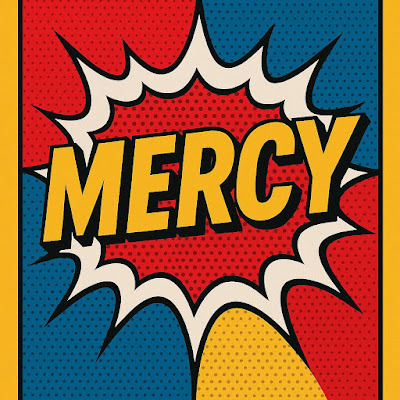18 Pentecost

October 12, 2025
+Do you ever find yourself obsessing over a word.
Sometimes,it seems, there are certain words that just get stuck in your brain.
Maybeit’s just me.
Maybeit’s just a poet thing.
But,I do find myself obsessing over words on occasion.
Oftenthere are words I find myself examining like a little jewel, turning it aroundand weighing it and considering it like it’s a brand new word.
Afew weeks ago, Cathy McMullen and I gave a talk at the NDSU Memorial Union atthe display for the 75th anniversary for the Institute for RegionalStudies.
Oneof our colleagues from Concordia College, Scott Olsen, was there, and during thequestion and answer period, Scott brought up a word that I had never heardbefore.
Theword was ekphrasis.
Abeautiful Greek word.
Ekphrasis.
Ekmeaning “out” (or we could say “recourse”)
Phrasismeaning “tell”
Totell out essentially.
Ekphrasisis then a literary device used to describe in a written way visual art.
Inother words, it is what we do when we write a poem or an essay or a story abouta visual piece of art like a panting or a photograph or a sculpture.
Inother words, it means writing about visual art in a literary way.
Asin writing a poem about a visual piece of art.
Itwas a great word.
Andit has been jumbling around in my head ever since.
Anotherone of those words I’ve recently enjoyed re-examining is the word “Mercy.”
It’sa beautiful word!
Itflows!
AndI love the fact that, in French, the word for “Thank you” is “merci.”
Mercyis something we tend to overlook.
Certainlyin regard to others.
Butlet me tell you, it is not something we overlook when it comes to us.
Tobe on the receiving end of mercy is a wonderful thing!
Mercyis like a fresh wonderful breeze on our face, especially if it is something weare being granted after a hardship in our lives.
Mercyis not something we think of too often in our lives, certainly not on a dailybasis.
Butfor Jesus and those Jewish people of his time, mercy was an important part oftheir understanding of the world and their relationship with God.
Tomorrow,at sundown, the week-long Jewish feast of Sukkot ends
Sukkotis an important feast in Judaism.
Itis also called “The feast of Booths,” which refers to the tents the Israeliteslived in during their 40 years in the desert.
Infact, in some Jewish homes, a tent is often set up during this high holy day asa commemoration of the feast.
Onthe Feast of Sukkot, the “Great Hallel” is prayed.
Hallelmeans “praise,” and refers to the group of psalms recited at the time of thenew moon, as well on feasts like Sukkot, which commemorates the period of timethe Tribe of Israel spent in the desert on their way to the Promised Land.
“Hallel”is the refrain from Psalm 136 that says,
“forGod’s mercy endures forever.”
Itis believed that Jesus himself would have sang the Great Hallael with hisdisciples when they went to the Mount of Olives after the Last Supper on thenight before his death.
Now,mercy in this context, means more than just forgiveness or some kind ofreprieve
Mercyalso means, in a Jewish understanding of the word, such things as God’senduring love for Israel and the mercy that goes with that love.
Mercyalso means, in this context, behaving in a particular way.
Itmeans being ethical and being faithful to God’s will.
Mercy.
It’san incredible word.
Andit is so packed with meaning and substance!
Andit’s one that I think sums up so many of the prayers we pray.
Certainly,the prayers I pray.
Inthose moments in which I am overwhelmed or exhausted or anxious or simply don’tknow what to pray, I often find myself just praying, Please, God, have mercy onme, or on the person for whom I’m praying.
Today,in our Gospel reading, we find that word, Mercy, in a very prevalent place.
Infact the petition the leper makes to Jesus is a powerful one.
“Jesus,Master, have mercy on me!”
Andwhat does Jesus do?
Hedoes just that.
Hehas mercy on him.
And,by doing so, Jesus sets the tone for us as well.
Justas Jesus showed mercy, so should we show mercy again and again in our ownlives.
Wesee, in our Gospel reading today, mercy in action.
Andit is a truly wonderful thing!
Theselepers are healed.
But,before we lose track of this story, let’s take a little deeper look at what isexactly happening.
Now,first of all, we need to be clear about who lepers were in that day.
Lepers,as we all know, were unclean.
Butthey were worse than that.
Theywere contagiously unclean.
Andtheir disease was considered a very severe punishment for something.
Sinof course.
Butwhose sin?
Theirown sin?
Orthe sins of their parents?
Orgrandparents?
Probablyall of it together.
So,to even engage these lepers was a huge deal.
Itmeant that to engage them meant to engage their sin in some way.
But,the real interesting aspect of this story is one that you might not havenoticed.
Thelepers themselves are interesting.
Thereare, of course, ten of them.
Ninelepers who were, it seems, children of Israel.
Andone Samaritan leper.
Nowa Samaritan, for good Jews like Jesus, would have been a double curse.
Itwas bad enough being a leper.
Butto be a Samaritan leper was much worse.
Samaritans,as we also know, were also considered unclean enemies.
Theydidn’t worship God in the same way that good, orthodox Jews worshipped God.
Good,orthodox Jews worshipped God in the Temple in Jerusalem.
Samaritanshowever had turned away from the Temple in Jerusalem.
Andthey didn’t follow the Judaic Law that Jews of Jesus’ time strived to follow.
Butthe lepers, knowing who they are and what they are, do the “right” thing(according to Judaic law).
Againand again, throughout the story they do the right thing.
Theyfirst of all stand far off from Jesus and the others.
That’swhat contagious (unclean) people do.
Andwhen they are healed, the nine again do the right thing.
Theyheed Jesus’ words and, like good Jews, they head off to the priest to bedeclared clean.
Accordingto the Law, it was the priest who would examine them and declare them “clean”by Judaic Law.
Butthey do one “wrong” thing before they do so.
Didyou notice what thing they didn’t do?
Beforeheading off to the priest, they don’t first thank Jesus.
Onlythe Samaritan stays.
Andthe reason he stays is because, as a Samaritan, he wouldn’t need to approachthe Jewish priest.
So,he turns back.
Andhe engages this Jesus who healed him.
Hecomes back, praising God and bowing down in gratitude before Jesus.
Afterall, it is through Jesus that God has worked this amazing miracle!
ButJesus does not care about this homage.
Heis irritated by the fact the others did not come back.
Still,despite his irritation, if you notice, his mercy remained.
Thoseungrateful lepers—along with the Samaritan—remain healed.
Despitetheir ingratitude, they are still healed.
Thatis how mercy works.
Theinteresting thing for us is, we are not always so good at mercy.
Weare good as being vindictive, especially to those who have wronged us.
Weare very good as seeking to make others’ lives as miserable as our lives are attimes.
Ifsomeone wrongs us, what do we want to do?
Wewant to get revenge.
Wewant to “show them.”
Afterall, THAT is what they deserve, we rationalize.
But,that is not the way of Jesus.
Ifwe follow Jesus, revenge and vindictive behavior is not the way to act.
Ifwe are followers of Jesus, the only option we have toward those who havewronged us is…mercy.
St
ill,even then, we are not so good at mercy, especially mercy to those who haveturned away from us and walked away after we have done something good for them.Ithurts when someone is an ingrate to us.
Ithurts when people snub us or ignore us or return our goodness withindifference.
Inthose cases, the last thing in the world we are thinking of is mercy for them.
Ofcourse, none of us are Jesus.
BecauseJesus was—and is—a master at mercy.
Andbecause he is, we, as followers of Jesus, are challenged.
Ifthe one we follow shows mercy, we know it is our job to do so as well.
Nomatter what.
Nomatter if those to whom we show mercy ignore us and walk away from us.
Nomatter if they show no gratitude to us.
Nomatter if they snub us or turn their backs to us or ignore us.
Ourjob is not to concern ourselves with such things.
Ourjob, as followers of Jesus, is simply to show mercy again and again and again.
Andto seek mercy again and again and again.
Havemercy on me, we should pray to God on a regular basis.
God,have mercy on me.
Please,God, have mercy on me.
Please,God, have mercy on my loved ones.
Please,God, have mercy on St. Stephen’s.
Please,God, have mercy on our country.
Please,God, have mercy on our planet.
Thisis our deepest prayer.
Thisis the prayer of our heart.
Thisis the prayer we pray when our voicesand our minds no longer function perfectly.
Thisis the prayer that keeps on praying with every heartbeat within us.
Andby praying this prayer, by living this prayer, by reflecting this prayer toothers, we will know.
Wewill know—beyond a shadow of doubt—that we too can get up.
Wetoo can go our way.
Wetoo can know that, yes, truly our faith has made us well.
Amen.



